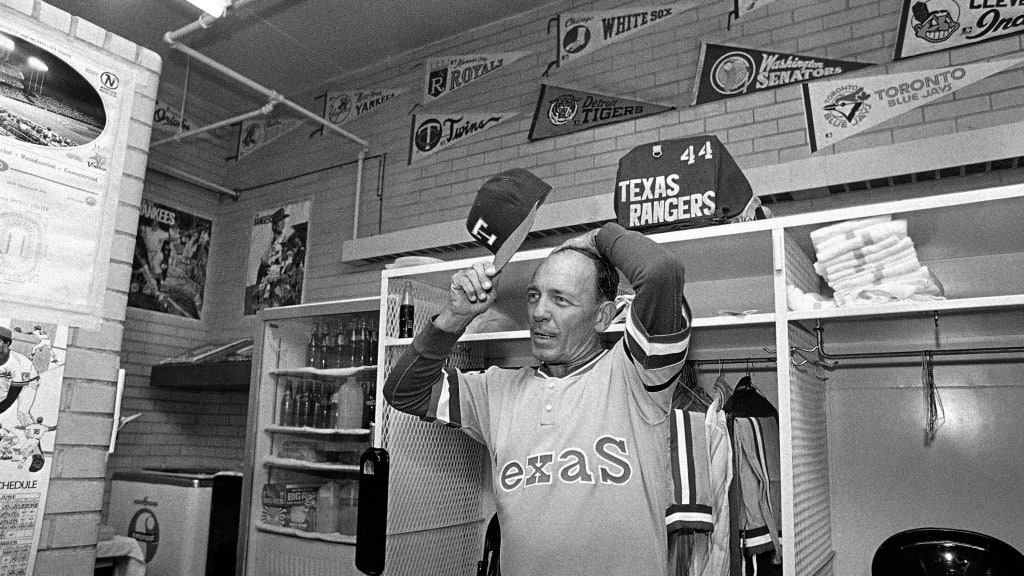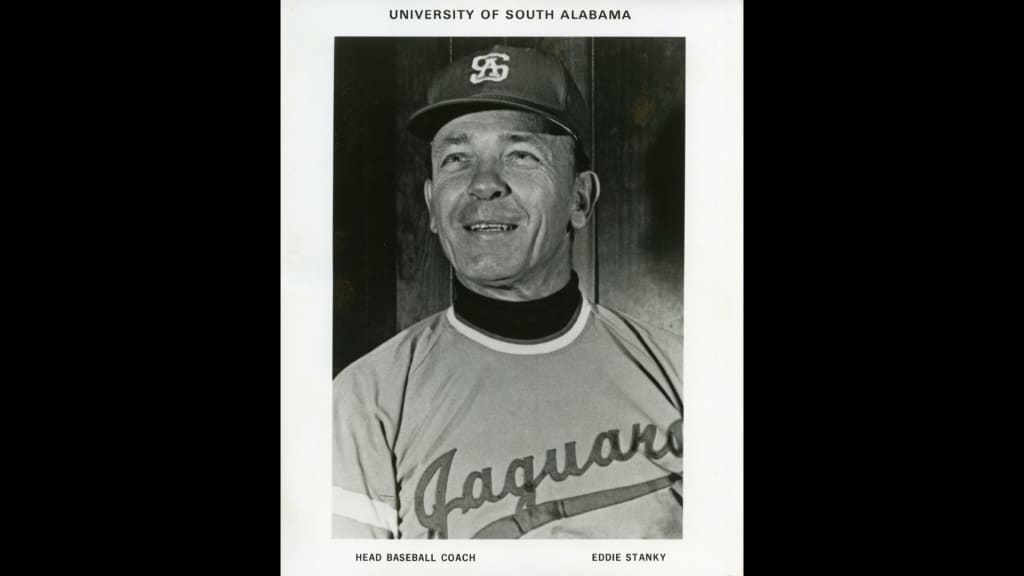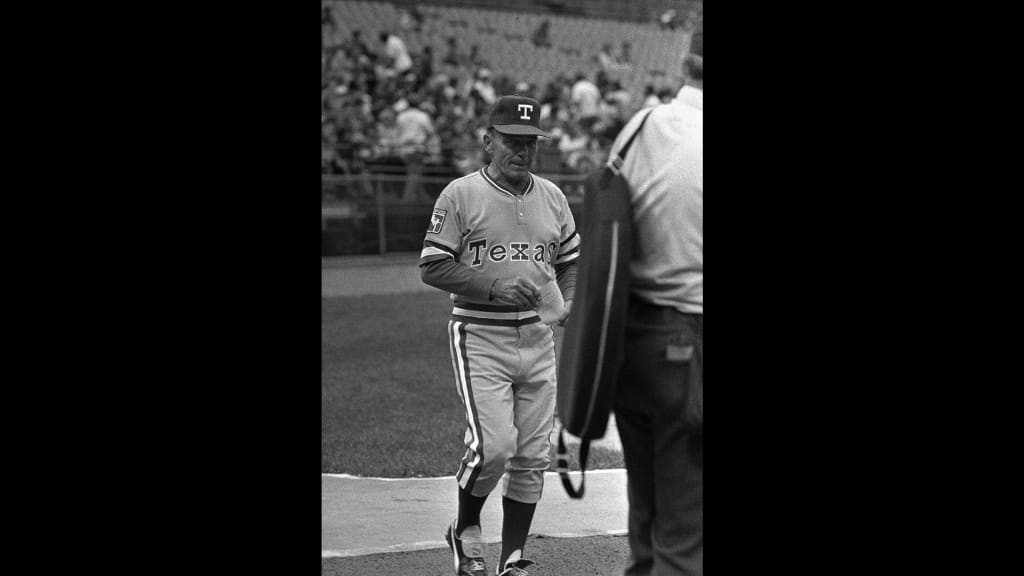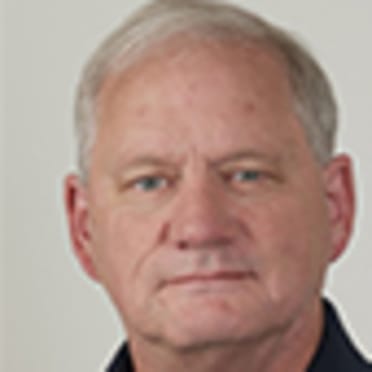
ARLINGTON -- Rangers general manager Eddie Robinson was not an early riser, but he was glad to pick up the phone when his manager, Eddie Stanky, called at 8 a.m. that Thursday in their Minneapolis hotel.
“Hey, Eddie,” Robinson said. “You want to get breakfast?”
Stanky said that’s not why he was calling.
“I’m at the airport,” Stanky said. “I’m getting on the next plane to go home. I’m going to turn down the job.”
Robinson wasn’t sure what “turning down” the job meant. The Rangers had just introduced Stanky as their new manager the day before, and he had been in the dugout for a 10-8 win over the Twins.
“What do you mean you’re going to turn down the job,” Robinson said. “You already took it.”
“I can’t leave my family,” Stanky said. “I’m getting on a plane and going home. I miss my family.”
Robinson said good-bye and hung up the phone.
“I was surprised, but ... he wasn’t even my first choice,” Robinson said this week as the 43rd anniversary of one of the most bizarre episodes in Rangers history approaches.
It’s the anniversary of Stanky -- the one-game manager -- being introduced on a Wednesday afternoon -- June 22, 1977 -- in Minneapolis and then quitting early the next morning. He was one of four managers the Rangers employed during that strange season.
“There was almost a fifth manager,” long-time Star-Telegram beat writer Jim Reeves said. “It was a wild and crazy two weeks. But it was always pretty crazy with the Rangers back then.”
Through it all, the Rangers won 94 games while finishing second in the American League West.
“The funny thing was when Stanky got there, he said we were a much better team than we had shown,” All-Star catcher Jim Sundberg said. “I guess we proved him right.”
The Rangers weren’t proving anything midway through June. Under manager Frank Lucchesi, the Rangers were hovering around the .500 mark.
“We just felt we needed a change in managers,” Robinson remembered. “The board of directors and owner Brad Corbett made the decision to change managers, and I didn’t think it was a bad idea.”
The group met in a suite during a game at Arlington Stadium and compiled a list of 10 candidates. Robinson wanted Billy Hunter, an ex-infielder who had been his roommate with the Yankees. Hunter was a third-base coach for Earl Weaver in Baltimore.
Stanky’s name wasn’t among the 10.
“We started to leave the box and I said, ‘There is one guy we left off the list, and that’s Eddie Stanky,’” Robinson said. “Everybody stared at me and said, ‘That’s who we should hire.’”
Stanky -- born Edward Stankiewicz in Philadelphia -- was 61 at the time. He had earned the nickname “The Brat” as a fiery and pugnacious second baseman over an 11-year career.
The great Branch Rickey once summed up Stanky by saying, “He can’t hit, he can’t field, he can’t throw and he can’t run. All he can do is beat you.”
After his playing career was over, Stanky managed the Cardinals from 1952-55, and the White Sox from 1966-68. After being let go by Chicago, Stanky became the head coach at the University of South Alabama and built the Jaguars into a powerhouse.

Robinson and Bill Seay, a member of the Rangers' board of directors, flew to Mobile, Ala., to gauge Stanky’s interest.
“Stanky wanted the job,” Robinson said. “That was obvious. We talked to him, and he said yes. The only drawback was he said he had something important to be at the next week and if we could wait until after that. We flew back to Texas, and Brad still wanted him.”
The Rangers lost three of four to the expansion Mariners over the June 17-19 weekend in Arlington, and Lucchesi was finished. Corbett, Robinson and the other members of the board decided to hire Stanky. As the team headed to Minnesota, Robinson and co-general manager Dan O’Brien flew to Mobile on Monday to work out the details.
Stanky agreed to a three-year deal, and the plan was to join the team in Minnesota on Wednesday. Lucchesi, highly regarded for his loyalty and integrity, was left to manage the Rangers until then. He did so while trying to maintain his dignity, but he lost control of his emotions while talking to reporters after a 9-5 loss to the Twins on Tuesday.
“I have a lot of respect for Frank,” Robinson said. “I really admired the way Frank handled that situation.”
Stanky was introduced at a press conference at Metropolitan Stadium, and he then met with his team prior to Wednesday night’s game with the Twins.
“I knew his background, and I was pretty excited,” said Tom Grieve, an outfielder that year. “I thought it would be fun playing for him. He reminded you of Billy Martin. The first time he talked to us, he was really upbeat. He seemed like he was really excited to be there and really happy he was back in the game. Everybody was feeling good.”
Stanky said he would rely heavily on Lucchesi’s coaching staff of Sid Hudson (pitching), Pat Corrales, Fred Koenig and Connie Ryan.
“I’m not going to come in here today and immediately say, ‘OK men, this is the way we are going to do it,'” Stanky said. “I don’t know the personnel well enough for that yet. I’ll be watching and observing for a while, and also seeking advice from the coaching staff.”
The Rangers won their first game under Stanky by rallying for a 10-8 victory. The only drawback was starting pitcher Bert Blyleven had to leave the game in the fourth with a strained groin muscle.
“Stanky showed up and gave an impressive locker room talk,” Sundberg said. “He said we were a better team than we had been playing, that he was glad to be there, took notes during the game. He looked like a little general. We won the game, and everybody was happy.”
“I was the starting pitcher that night,” Blyleven said. “He gave his speech, and then I went about getting ready for my start. In the first inning, I strained my groin muscle. I didn’t pitch again for something like 12 days. I came out in the fourth inning, and I was icing my groin in the training room. I don’t think I ever talked to him. I don’t remember if he came back and asked me how I was doing.”

Stanky took the team bus back to the Leamington Hotel, which was considered one of the worst in the American League. He said good night to Ryan and made arrangements to have breakfast with him in the morning.
“He was elated,” Robinson said. “Coming back to the hotel in the team bus, they told me he was in good spirits.”
The next morning ...
“He was gone,” Sundberg said. “We were shocked. How often do you have one guy who comes in for one day and leaves? It just doesn’t happen. The way he presented himself, it looked like he was in it for the long haul.”
There were a few jokes. One said all it took was for Stanky to spend one night in the Leamington and that was enough. Another suggested he saw reliever Mike Marshall using a hair dryer and that scared him off.
Stanky called infielder Toby Harrah from the airport to wish him well and urge him, Sundberg and Mike Hargrove to take a bigger leadership role. He was about to call Sundberg when his plane was called.
“I heard a rumor that he didn’t like big league players,” Blyleven said. “But we had Sunny and Claudell Washington and Bert Campaneris, Willie Horton, Mike Hargrove and Toby Harrah. We had a class group of guys. I think he just missed his family. I don’t think it had anything to do with the players.”
Ten minutes after Robinson talked to Stanky, the general manager got another call, this time from another old Yankees teammate -- Yogi Berra. The Hall of Fame catcher wanted to call Stanky but had been misdirected by the hotel operator.
Robinson told Berra he had called the wrong room.
“Oh, I was calling Stanky to congratulate him on taking the job,” Berra said.
Robinson told Berra that Stanky had just quit.
“What do you mean he quit?” Berra asked.
“He just quit this morning,” Robinson told him. “Do you want the job?”
Berra declined.
Back in Mobile, Stanky told reporters, “I got to the room and couldn’t sleep. I called my wife and told her I was coming home. I want the people of Texas to know the real and exact reason. God, I wanted that team. But I had to weigh my contract against my family.”
Grieve said there was no anger or resentment on the part of the Rangers players.
“I think he accepted the job in good faith and just changed his mind,” Grieve said. “I’m glad he did it quickly and got back to where he was comfortable rather than thinking about it all summer and being miserable away from his family. He thought it was something he wanted to do, and it didn’t work out. I respected him for it.”
Stanky ended up going back to coaching South Alabama. Sundberg said he never spoke to him again.
“It’s not like we had any kind of relationship,” Sundberg said. “I don’t even remember us having a conversation other than talking during the game. How close can you get to a guy after one game?”
Ryan took over as interim manager for six games but wasn’t interested in a permanent arrangement. The Rangers -- in another strange move -- offered the job to Harmon Killebrew, the Hall of Famer slugger who had just retired after the 1975 season and had no managerial experience.
“Brad Corbett knew Killebrew somehow, and I liked him,” Robinson said. “He wanted Killebrew to be his manager.”
Killebrew was reluctant, and Corbett backed out. He didn’t want another manager leaving after one game. Finally, Robinson convinced Corbett to hire Hunter.
That proved to be the right move. The Rangers were 34-35 when Hunter took over, and he led them to a 60-33 finish. For two days in August they were in first place before the Royals pulled away by winning 38 of their last 48 games.
Still, Robinson was happy.
“I ended up getting my No. 1 guy,” he said.
